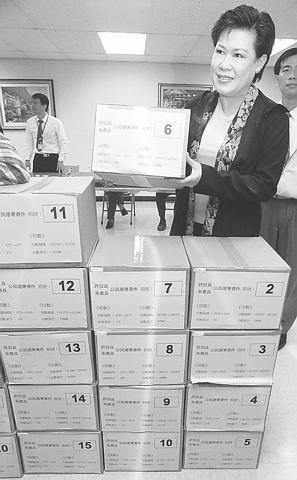As tomorrow is the deadline for independent presidential candidates to hand over the required 224,000 signatures for the March election, independent presidential candidate Hsu Hsin-liang (許信良) yesterday handed over the first batch of signatures to the Central Election Commission (CEC中選會).
Chu Hui-liang (
"Hsu has already collected more than 300,000 signatures," Chu said today they will hand over another 100,000 signatures and give out the rest of the signatures on the last day. Chu called for more signatures so as to avoid overlapping or duplicating signatures with other candidates.

PHOTO: CHEN CHENG-CHANG, TAIPEI TIMES.
According to election regulations, overlapping signatures are nullified for both sides. If too many signatures overlap it could result in a politician losing his or her candidacy.
The Taiwan Independence Party's candidate Cheng Pang-cheng (
An official of the party said the Cheng-Huang ticket has suffered insufficient resources partly because they were the latest to join the election campaign.
The official said pressure from pro-independence party elders, who have called on support for DPP presidential candidate Chen Shui-bian (
While the Cheng camp is worried about insufficient support, an aide to independent presidential candidate James Soong (
The official said they are worried that the exposure of all their signatures may bring trouble to some of their supporters, although they didn't provide any details as to why this was so. The Soong camp yesterday called a meeting to decide how many signatures they should hand over.
In related news, although signature drives are not required for presidential candidates nominated by major parties, the KMT is undertaking a signature drive for its candidate Lien Chan (
"This is a test of mobilization," said KMT spokesman Huang Hwei-chen (

INVESTIGATION: The case is the latest instance of a DPP figure being implicated in an espionage network accused of allegedly leaking information to Chinese intelligence Democratic Progressive Party (DPP) member Ho Jen-chieh (何仁傑) was detained and held incommunicado yesterday on suspicion of spying for China during his tenure as assistant to then-minister of foreign affairs Joseph Wu (吳釗燮). The Taipei District Prosecutors’ Office said Ho was implicated during its investigation into alleged spying activities by former Presidential Office consultant Wu Shang-yu (吳尚雨). Prosecutors said there is reason to believe Ho breached the National Security Act (國家安全法) by leaking classified Ministry of Foreign Affairs information to Chinese intelligence. Following interrogation, prosecutors petitioned the Taipei District Court to detain Ho, citing concerns over potential collusion or tampering of evidence. The

Seventy percent of middle and elementary schools now conduct English classes entirely in English, the Ministry of Education said, as it encourages schools nationwide to adopt this practice Minister of Education (MOE) Cheng Ying-yao (鄭英耀) is scheduled to present a report on the government’s bilingual education policy to the Legislative Yuan’s Education and Culture Committee today. The report would outline strategies aimed at expanding access to education, reducing regional disparities and improving talent cultivation. Implementation of bilingual education policies has varied across local governments, occasionally drawing public criticism. For example, some schools have required teachers of non-English subjects to pass English proficiency

NEGOTIATIONS: The US response to the countermeasures and plans Taiwan presented has been positive, including boosting procurement and investment, the president said Taiwan is included in the first group for trade negotiations with the US, President William Lai (賴清德) said yesterday, as he seeks to shield Taiwanese exporters from a 32 percent tariff. In Washington, US Trade Representative Jamieson Greer said in an interview on Fox News on Thursday that he would speak to his Taiwanese and Israeli counterparts yesterday about tariffs after holding a long discussion with the Vietnamese earlier. US President Donald Trump on Wednesday postponed punishing levies on multiple trade partners, including Taiwan, for three months after trillions of US dollars were wiped off global markets. He has maintained a 10 percent

TRADE: The premier pledged safeguards on ‘Made in Taiwan’ labeling, anti-dumping measures and stricter export controls to strengthen its position in trade talks Products labeled “made in Taiwan” must be genuinely made in Taiwan, Premier Cho Jung-tai (卓榮泰) said yesterday, vowing to enforce strict safeguards against “origin laundering” and initiate anti-dumping investigations to prevent China dumping its products in Taiwan. Cho made the remarks in a discussion session with representatives from industries in Kaohsiung. In response to the US government’s recent announcement of “reciprocal” tariffs on its trading partners, President William Lai (賴清德) and Cho last week began a series of consultations with industry leaders nationwide to gather feedback and address concerns. Taiwanese and US officials held a videoconference on Friday evening to discuss the